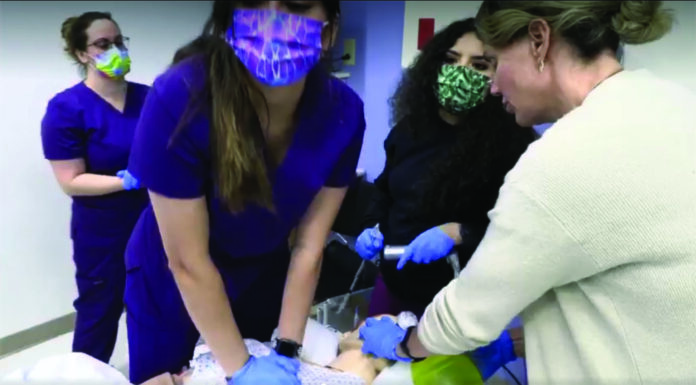
MIDLAND Second year respiratory care students at Midland College took part in a first-ever mass casualty simulation on Oct. 29.
First, students had to find 20 teddy bear “victims” scattered around the center. Each had tags describing their symptoms which ranged from burns and cuts to missing limbs. Students then triaged the patients and organized them into groups according to their degree of injury and treatment plan. The teddy bears who could be helped turned into the lab’s top-of-the-line SimMan 3G training manikins. Behind control room doors, professors activated and controlled the manikins” symptoms as the students worked to save lives.
“We triaged patients into four different colored zones,” Elizabeth Van Schalkwyk, Respiratory Care student, said. “Red was immediate care; yellow was intermediate, they can wait; green was ok to be released; and blue/black meant that patient was a loss, we had to pass them up for other patients we could help. The last zone was the hardest.”
“We were looking at the students’ communication with each other and their teamwork skills,” Kally Eddison, chair for Respiratory Care said. “They had no idea what was going to happen. We wanted to put them in a situation where they had to work together and communicate since those skills are such an important aspect of healthcare. The students did awesome. It was a good learning experience, and I think they had fun doing it. The fun, hands-on aspect of this exercise makes the learning stick with them.”
“This simulation was very beneficial in learning how to triage,” Esperanza Balerio, Respiratory Care student said. “We never know when an event like this might happen, and we have to be ready. One of our teddy bear patients turned into a training manikin that coded. Coding is a stressful situation: you are looking at the monitor, thinking what meds can we give, and do they need to be intubated? We did active CPR for almost 10 minutes. Respiratory therapists are very active, more active than people realize. When we think about the hospital we think about nurses and doctors; you don’t hear talk much about respiratory therapists. Now after COVID you may hear more about us because we work the ventilators, but we have always played a vital role and have a huge impact on a patient’s life.”
As for the fate of the teddy bears? The National Student Nurses Association is holding a teddy bear drive to support the Children’s Advocacy Center of Midland and these teddy bear victims will be donated to that drive.
“I am excited about seeing this cohort graduate,” Eddison said. “They will make a huge impact on our community. Our hospitals need respiratory therapists. If anyone is interested in the respiratory care program, come on down to MC and get started!”
Professors are planning another triage drill for next year.
An Associate of Applied Science for Respiratory Care at MC offers unique challenges in the areas of prevention, diagnostics, treatment, management, and rehabilitation of people with respiratory and/or cardiac abnormalities. Graduates are involved in a variety of lifesaving and life-supporting situations, working side by side with physicians, nurses, radiographers and others on the healthcare team, treating patients ranging in age from premature newborns to senior citizens. Graduates from MC’s program are prepared to work in hospitals, emergency departments, intensive care units, neonatal intensive care units, diagnostic laboratories, offices, clinics, long-term care facilities and homes.



